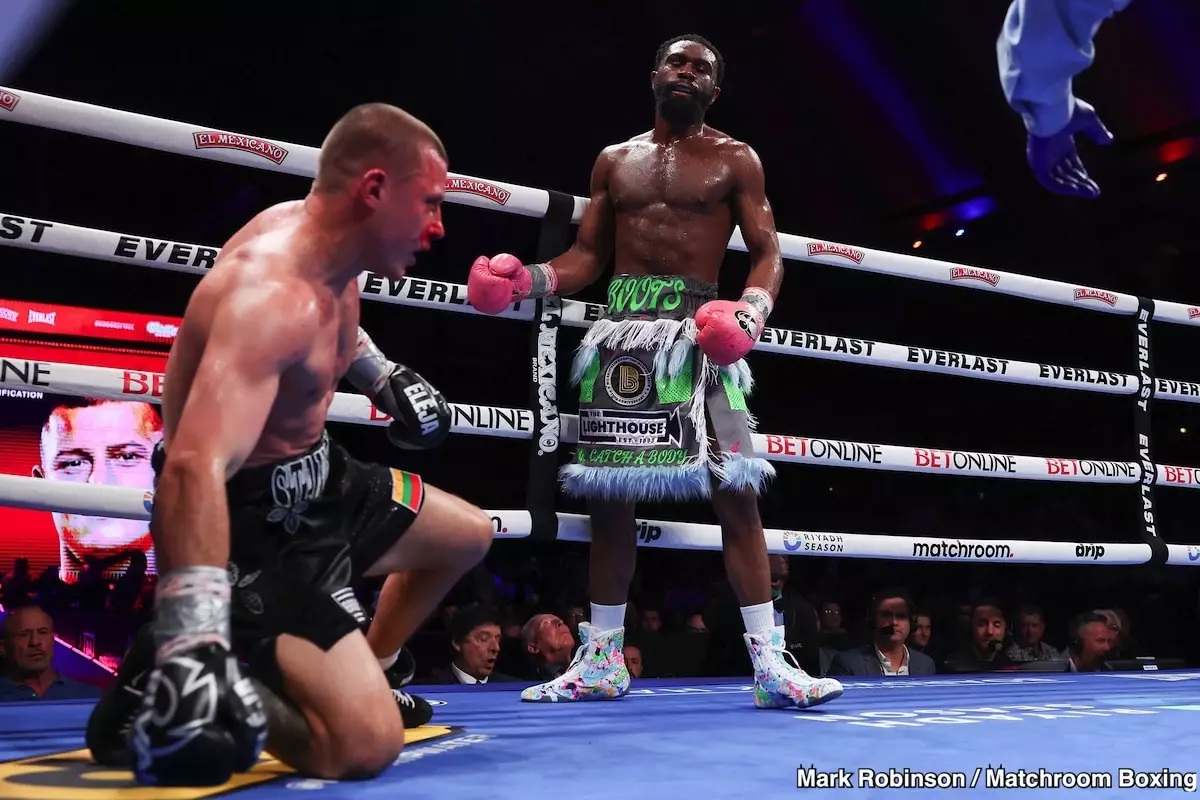The boxing world is rife with promise and potential, and no one seems more enraptured by this illusion than promoter Eddie Hearn. Following a decisive sixth-round TKO victory for Jaron “Boots” Ennis over Eimantas Stanionis, Hearn’s exuberance soared to dizzying heights. With unabashed confidence, he claimed that Ennis would easily dispatch anyone in the welterweight or junior middleweight divisions, including the formidable Vergil Ortiz Jr. However, such declarations warrant scrutiny, particularly when considering the broader context of skill sets, competitive behaviors, and recent performances.
For Ennis, who boasts an impressive record of 34-0 with 30 knockouts, this victory has fueled discussions of his prowess. Yet, the standard of evaluation for a fighter’s potential should not solely be built on one impressive outing against a less-than-stellar opponent. Stanionis, with a record of 15-1, did not come across as the best fighter in the welterweight realm during their bout, and Hearn’s claim that he represented the pinnacle of the division seems overblown.
The Questionable Comparison to Vergil Ortiz Jr.
When Hearn confidently declared that Ennis would “beat Vergil Ortiz Jr. easy,” he spoke not just to the present but, perhaps, to misplaced aspirations of grandeur. Vergil Ortiz Jr., standing at 23-0 with 21 KOs, has demonstrated an impressive fighting style that hinges on power and technique. Making claims that Ennis could handle him without difficulty requires not only a keen understanding of their respective talents but also a level of objectivity that sometimes eludes promoters enveloped in the fervor of their own narratives.
The choice of Ennis to sidestep a matchup with Ortiz Jr. raises questions about his faith in his capabilities. Why would a gifted fighter opt to face Stanionis—an opponent perceived by many to be less challenging—if he truly harbors the title of a future champion? This decision introduces an unsettling variable: the possibility that Ennis may not yet feel prepared to conquer the more dangerous terrain of 154 lbs, grappling against established heavy-hitters.
The Boxing Landscape: Who’s Really the Best?
The boxing landscape is as treacherous as it is thrilling, populated with fighters whose skill levels vary significantly, reminding us that one victory does not define supremacy. Stanionis’s lackluster performance against Ennis proved that he may not be equipped to compete against the elite of the division. His struggles suggest a vulnerability that Ennis should have exploited to further solidify his reputation. Instead, Hearn’s assertions would have us believe that Ennis’s performance against Stanionis is a beacon of his supremacy at 147 lbs.
While it’s wonderful to celebrate the achievements of rising stars like Ennis, it’s crucial to distinguish hype from genuine capability. The reality is that the welterweight division teems with talented fighters waiting for their chance. Individuals like Brian Norman Jr., Shakhram Giyasov, and even Devin Haney present significant challenges that Ennis would need to overcome to solidify his status.
The Reality Check: Need for Caution
To lay the groundwork for future bouts, it’s vital to tread with caution when declaring one’s dominance over opponents—especially in a field as competitive as boxing. While Eddie Hearn’s optimism for Ennis is understandable, it does a disservice to the carefully constructed facade of competition in boxing. An overzealous proclamation from a promoter based on one fight could derail a young fighter’s career trajectory, steering him into matchups ill-suited for his skill level or readiness.
Ultimately, the world of boxing thrives on the artistry of unpredictability. While Ennis exhibits spectacular potential, comparisons should be grounded in a long-term view of performance and readiness rather than immediate triumphs against sub-par competition. Enthusiasts and analysts alike should advocate for a more judicious approach to identifying who truly reigns supreme in these weight divisions, finding balance between excitement and realism. The sport deserves a champion who can withstand scrutiny and transcends mere hype—an entity as worthy outside the ring as they are within it.

